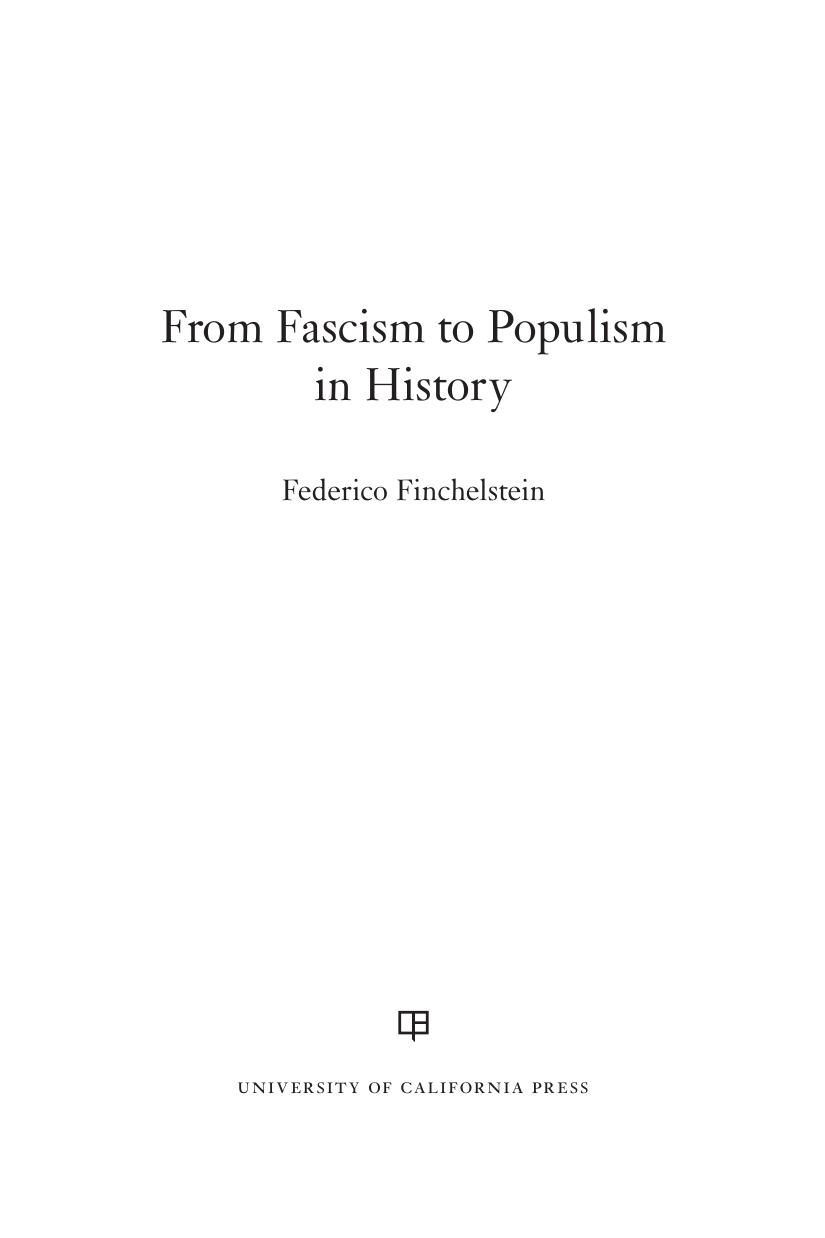From Fascism to Populism in History by Federico Finchelstein

Author:Federico Finchelstein [Finchelstein, Federico]
Language: eng
Format: epub, pdf
Tags: History, General, World, Political Science, Political Ideologies, Fascism & Totalitarianism
ISBN: 9780520968042
Google: RSwtDwAAQBAJ
Publisher: Univ of California Press
Published: 2017-09-26T00:52:34.648000+00:00
THREE
Populism between Democracy and Dictatorship
Dictatorship is one of the foundations of modern populism, and yet populism is not dictatorship. In the context of the early Cold War period, this paradox played out in modern populism’s renunciation of dictatorial rule, which in turn created a new, authoritarian regime form of democracy. The fascist dictatorial experience was a key factor in the emergence of populist regimes, and populism was is in part defined in terms of its opposition to dictatorship. “Fascist dictatorship,” a specific historical type of mass modern dictatorship, then, is central to the genealogy of populism. Some approaches to populism emphasize the more recent oppositional links and continuities between populism and Cold War dictatorships, and in these pages, I am in conversation with those perspectives. In contrast to them, I stress the need to understand the ambivalent, oppositional nature of populism in terms of its firm rejection of pre–Cold War fascism’s version of dictatorial rule.1 Populism was a form of antiliberal, authoritarian democracy well before the emergence of the now classic Cold War dictatorships in Brazil, Pakistan, El Salvador, and many other places, and it was and continues to be defined by its contextual rejection of dictatorship. At the same time, populism still shares some dictatorial elements, carried forward especially from the remnants of the fascist global experience of mass dictatorship that ended after the end of World War II.
Can populism as an ideology, a movement, and a regime be democratic and highly anti-institutional? Can an anti-institutional style of politics that shares many dimensions with dictatorship become its opposite? Or, rather, can pondering populism’s incongruities take us only so far if, as I argue, both are true and have always been part of the experience of modern populism. Answering these questions, therefore, requires understanding how and why these apparent contradictions became part of populism when it was finally constituted as a regime form after 1945. Moreover, the answers are embedded in the complex and varying connections between populism and dictatorship that have existed in different contexts, which is to say that the theoretical question posed by the affinities between populism and dictatorship needs to be framed historically. Surprisingly, many scholars of populism, especially those who provide the more simplistic definitions, or the ones that only study populism as a movement in opposition, do not address the key issue of what was happening when populism reached power. Yet this is key for understanding the history and theory of populism. To put it bluntly, it is not possible to have a complete picture of populism without analyzing how and why it ruled.
Anti-institutionalism is a central facet of fascist dictatorships and modern populism in power. To be sure, both attempted to overcome a perceived sense that liberalism was in crisis, which they characterized as a crisis of democratic representation. For example, fascist dictators and populist leaders rejected the mediating role of institutions and aimed to establish a direct organic link between the leader and the people. But what are the differences between populism
Download
From Fascism to Populism in History by Federico Finchelstein.pdf
This site does not store any files on its server. We only index and link to content provided by other sites. Please contact the content providers to delete copyright contents if any and email us, we'll remove relevant links or contents immediately.
The Secret History by Donna Tartt(19086)
The Social Justice Warrior Handbook by Lisa De Pasquale(12190)
Thirteen Reasons Why by Jay Asher(8909)
This Is How You Lose Her by Junot Diaz(6885)
Weapons of Math Destruction by Cathy O'Neil(6279)
Zero to One by Peter Thiel(5801)
Beartown by Fredrik Backman(5753)
The Myth of the Strong Leader by Archie Brown(5507)
The Fire Next Time by James Baldwin(5442)
How Democracies Die by Steven Levitsky & Daniel Ziblatt(5218)
Promise Me, Dad by Joe Biden(5153)
Stone's Rules by Roger Stone(5087)
A Higher Loyalty: Truth, Lies, and Leadership by James Comey(4960)
100 Deadly Skills by Clint Emerson(4924)
Rise and Kill First by Ronen Bergman(4788)
Secrecy World by Jake Bernstein(4752)
The David Icke Guide to the Global Conspiracy (and how to end it) by David Icke(4717)
The Farm by Tom Rob Smith(4507)
The Doomsday Machine by Daniel Ellsberg(4490)
